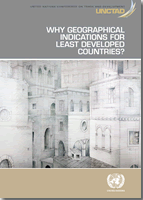UNCTAD is launching a publication entitled: Why Geographical Indications in Least Developed Countries?. The book contains lessons learned in using Geographical Indications (GIs) to promote traditional product in selected LDCs.
GIs are a trade-related intellectual property right under the WTO TRIPS Agreement. The link between the territory and the uniqueness of the product is the distinctive developmental nature of GIs.
Limited export diversification and low value added of LDCs exports have been identified as a long standing factor affecting the economic growth and poverty reduction strategies of LDCs.
Yet, thanks to their rich biodiversity a valuable array of products and preparations is available in selected LDCs with a potential to graduate into "excellence" products and compete globally.
UNCTAD in collaboration with FAO and Slow Food foundation for biodiversity has assisted selected rural communities and products in LDC to promote their products using geographical indications.
The idea of the UNCTAD initiative is that the success of GIs in Europe and, increasingly, in a number of developing countries, could also be extended to promote the value of the products in LDCs and the link to their territory, a guarantee for their uniqueness, ultimately allowing farmers to remain in their land.
The UNCTAD publication contains the following experiences:
- Buthanese rice
- Kampot Durian, Cambodia
- Kampot Pepper
- Harenna Wild Coffe, Ethiopia
- Wenchi Volcanic, Ethiopia
- Wukro honey, Ethiopia
- Ziama-Macenta robusta coffee, Guinee
- Coffee from the Bolaven Plateau, Laos People's Democratic Republic
- Pink rice from Amparafaravoly, Madagascar
- Imraguen women's mullet Bottarga, Mauritania
- White prawn, Mozambique
- Tete Goat, Mozambique
- Fruits from lower Casamance, Senegal
This book launch is organized in cooperation with H.E the Ambassador of Benin as Coordinator of the LDC WTO group and the Delegation of Italy to the UN Organizations in Geneva that co-funded this initiative.
Given the link of the traditional products to their territory the launch will be accompanied by the presentation of the catalogue of the Artist Maurizio Cancelli - Village Earth - that has represented UNCTAD at the UN 70 Anniversary and artist Koffi Gahou, from Benin witnessing the commitment of these artists to represent trough their work the attachment to their territory as a cultural value for the human development.

